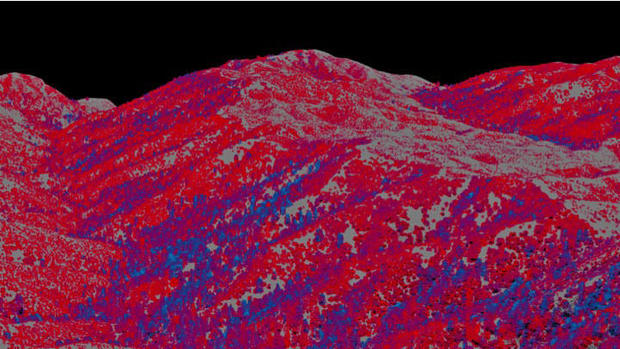Laser-Guided Imaging Reveals California May Lose 58 Million Drought-Starved Trees
SAN FRANCISCO (CBS SF) -- High-tech imaging has revealed the dire, drought-starved state of tens of millions of California's oldest, tallest trees. Even heavy rains from a persistent, strong El Niño may not save them.
A team of scientists, led by Greg Asner mapped the changes in California's forest canopies over a four-year span using airborne, laser-guided spectroscopy tools, and satellite-based models. From high above, inside the Carnegie Airborne Observatory (CAO), the team was able to assess the 'canopy water content' -- or CWC -- the amount of water in the foliage of the trees. Their results were published in Proceedings of the National Academy of Sciences.
According to the researchers, CWC is not only an important indicator of tree health, it shows progressive drought effects, and can predict fire risk. The CWC measurements they observed revealed the debilitated condition of California's forests, and foretold of long-term changes impacting animals, biodiversity and the overall landscape of the state.
The advanced imaging revealed approximately 41,000 square miles of forest covered by 888 million trees sustained "measurable losses in canopy water," between 2011 and 2015.
"Of this group, up to 58 million large trees reached water loss threshholds that the scientists deemed extremely threatening to long-term forest health," according to a press release. "Given the severity of the situation, even with increased precipitation due to El Niño, if drought conditions reoccur in the near future, the team predicts that there would be substantial changes to already significantly weakened forest structures and systems."
Asner hopes continued airborne and satellite monitoring will help California mitigate the negative impact of the drought and spur forest recovery. He points out the strong connection between the health of California's trees and the health of the state.
"California relies on its forests for water provisioning and carbon storage, as well as timber products, tourism, and recreation, so they are tremendously important ecologically, economically, and culturally," he said.
CBSSF.com writer, producer Jan Mabry is also executive producer and host of The Bronze Report. She lives in Northern California. Follow her on Twitter @janmabr.





